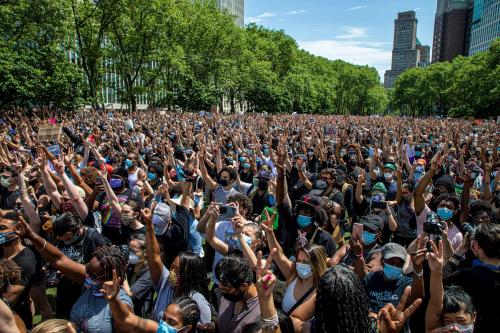This article is part of the New Transatlantic Bridge Initiative. For more than 70 years, the transatlantic community has been among the world’s most important partnerships and alliances and an anchor of global democracy, stability, and prosperity. That community includes governmental and nongovernmental relationships in the U.S. and Europe, as well as Canada, the European Union, NATO, and other entities and stakeholders. The transatlantic alliance is now under internal and external stress in ways that we have not seen in many decades—if ever. In response, the New Transatlantic Bridge Initiative by the Brookings Anti-Corruption, Democracy, and Security (ACDS) project analyzes those stresses and engages a wide set of stakeholders on both sides of the Atlantic to identify how those stresses can be addressed.
Certainly since World War II, and arguably since World War I, the U.S.-Europe relationship has been the world’s most important alliance and an anchor of global democracy, stability, and prosperity. That alliance is now under internal stress in ways that we have not seen in decades—if ever. In response, the Brookings Anti-Corruption, Democracy, and Security (ACDS) project is launching a “Transatlantic Bridge” initiative, which will seek to analyze those stresses and how they can be addressed with the quality, independence, and impact that are the hallmarks of the Institution’s work.
As one of the keystones of that bridge, we will be conducting interviews with champions of the transatlantic relationship in the U.S. and Europe alike. For the second interview in this series, Norman Eisen interviewed Igor Blaževič in Prague, Czech Republic, on April 3, 2025, at 12:30pm EDT/6:30pm CEST. Eisen is a Brookings senior fellow, the lead researcher for all three editions of the Brookings Democracy Playbook, and the former U.S. ambassador to the Czech Republic. Blaževič lives in Prague, where he currently serves as a program director at the Prague Civil Society Centre. He also founded and previously served as the director for the largest human rights documentary film festival in Europe: One World International Human Rights Film Festival.
The following text has been edited for length and clarity.
Assessment of transatlantic democracy
Norman Eisen:
What’s your assessment of how transatlantic democracy is doing right now?
Igor Blaževič:
It’s not in good shape, as we know. We don’t know how much more damage will be done. The Trump administration has changed and disrupted profoundly the transatlantic alliance. I don’t know how things will develop in the United States, which remains to be seen and decided there.
But I think that what we will see is the European Union continuing to have open doors for the revival of productive alliance relations with the U.S. across Europe. I don’t think the EU will give up on that. There will be constant effort to keep it. On the other side, Europe will need to shrink into its own effort to increase its own capacity to defend itself and to help Ukraine survive. Both of these things will have a very negative global impact, because the European approach was always second to the United States’ approach in standing by democrats around the world. Europe was never the leader, but it was the second backer. Now, with the Trump administration withdrawing from that, Europe will not be capable to pick up the global support for democracy but will try to focus more on defending itself and defending as much as is possible in a close neighborhood.
Countries that will fill the democracy gap
Norman Eisen:
You used the traditional phrase of “shrinking into itself.”
But is it possible to describe what Europe will do now as expanding into itself? Will Europe have to broaden and deepen its capacities?
Igor Blaževič:
Yeah, we can say that it is increasing its own capacity, but we need to be realistic. Any decisionmaking in Europe is very slow and complicated. This is a complex beast. We and Europe cannot give up on constant consensus and alliance building. So, it will be a slow and less effective process, but I think that the political decision has been done. The awareness of what is needed to be done is here. You can say expanding, but I still call it a shrink because there will be a certain amount of narrowing the scope of what Europe is able to do. I mainly work with Canada’s assistance in a democracy internationally, including in Myanmar and across the post-Soviet region around the world. What I see is that Europe will not fill the gap which is emerging there, but I do feel and see a willingness and capacity of Europe to focus at least on itself and on a close neighborhood.
Norman Eisen:
And who will the partners be? Will it be Australia? Will it be Canada? Who else besides Europe will fill the democracy gap?
Igor Blaževič:
Nobody. Canada will do a little bit, but nobody can replace the U.S.
Norman Eisen:
Who else will make contributions (small, medium, or large) besides Europe?
Igor Blaževič:
In this moment, I see Europe and Canada. I don’t see in this moment anybody else. I don’t think Australia will do it. I might be wrong, but I don’t see it right now. Australia has already for some time been much more pragmatic. Japan will not do it at all because Japan again has its own big task to reorganize itself for self-defense.
It’s very hard to predict how things will develop, but you see how the U.S. traditional allies in Asia are reorienting themselves. South Korea and Japan have signed a free trade agreement with China.
This shift has already been obvious for a longer time with Indonesia, Thailand, and a number of the countries who started to position themselves between the U.S. and China. They tried to benefit from China economically and from the U.S. from the geopolitical point of view. Now it’s more traditional allies like Japan and South Korea that are also shifting. So, the impact has been huge. Others, like Australia, Canada, and Europe, cannot influence these kinds of things because none of them are global players [to the extent of the U.S.].
Interaction of the civil society and government sectors
Norman Eisen:
There’s much more to the United States than just the White House. There are allies of democracy in Congress and in the states with governors, mayors, and cities. Who else can help preserve the transatlantic relationship and how? What would Europe like to see? What would you like to see now?
Igor Blaževič:
My work is not about the United States; it’s about other things. I’m not Czech, I am Bosnian, but I’m kind of deeply embedded here.
I have experiences here of me and my Czech friends in civil society standing in solidarity with the people fighting for democracies in other parts of the world.
We had a partner in the Czech Republic for a very long time. President Havel was a strong advocate and partner. This has been a moment when the Czech Foreign Ministry has also been a partner in standing with democracies around the world.
There was also once a time when the Czech state was not that kind of a partner, and the Czech Foreign Ministry was not a partner, but that did not stop us as an active civil society in continuing. It doesn’t depend on the state whether we do [support those fighting for democracy] or not. We do it anyhow. If the state is our partner, it is good for us and good for everybody. If not, it doesn’t matter, and we continue. So, in that sense, I do think in this moment there will be quite a number of people and institutions here who will be in solidarity with the forces defending democracy in the United States.
There will be mutual understanding, solidarity, and empathy. At the same time, I do think that the Czech state will be very careful not to be part of it officially. The Czech state will probably continue to navigate themselves in a way that they don’t alienate themselves from the current holder of the White House for all different reasons. Government actors will be cautious.
Norman Eisen:
Do you think the other Europeans will be the same?
Igor Blaževič:
Let’s say that I think that they will. I can’t imagine in this moment anybody doing what Canada is doing. Eastern Europe has a profound historic mistrust toward the “old traditional Europe”: France and Germany. There is always a deep historic sense that you can never fully rely on France and Germany and Italy and Spain. This is not just memory, it is a really deep historic gene of collective memory. So that means that this part of the world will do anything they can to not give up on the transatlantic geopolitical status quo that we waited for for so long. We paid a heavy price because we didn’t have it. We have done a lot of effort to gain it and for that reason, there will be an enormous amount of patience and desire to preserve it. Strategic patience, no matter the provocations. I think it is wise because, at the end of the day, there is still an understanding that nobody can help you defend you but the United States. Europe will now try to increase its own capacity, but there is profound experience. Nobody still can provide you the geopolitical security as the United States vis-a-vis the Russians.
The NGO sector
Norman Eisen:
We focused on the first sector, the public sector, and I made the point that there is much more to that sector than just the federal executive. What about the NGO sector (where there are profound shared commitments to democracy), where American NGOs, European NGOs, and the press can fill the gap? What do you expect from the NGO world to maintain these transatlantic commitments?
Igor Blaževič:
I think there will be natural solidarity and understanding of the democratic forces in the United States trying to defend democracy.
We here see that as our own struggle. We follow it very carefully, but in a certain way there is a hidden part of the tradition here that we believe that the democracy in the United States is strong enough to defend itself. That the democracy in some other countries is not strong enough to defend itself. Our mission here has always been not so much in the fragile countries but really in the dictatorships, because again our profound history is being small and powerless dissidents against a strong opponent.
-
Acknowledgements and disclosures
The authors would like to thank Madison Gee for fact-checking assistance, Robin Lewis for copyediting assistance, and Eric Urby for editorial assistance.
The Brookings Institution is committed to quality, independence, and impact.
We are supported by a diverse array of funders. In line with our values and policies, each Brookings publication represents the sole views of its author(s).







Commentary
The Transatlantic Bridge: Igor Blaževič on the countries that will fill the democracy gap
May 20, 2025